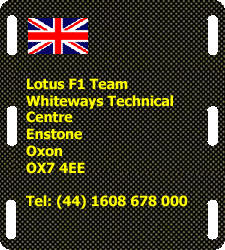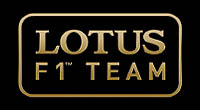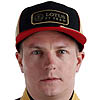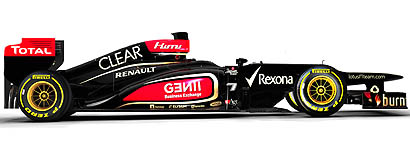|
In 2011, Group Lotus and Tony Fernandes continued their fight over naming rights, and following a ruling in May the Malaysian team could continued using the "Team Lotus" name and Team Lotus roundel, but could not use "Lotus" on its own.
The ruling also confirmed Fernandes as the owner of the Team Lotus name, having bought the rights to the name from David Hunt. However, the court ruling stated that Group Lotus had sole right to use the name "Lotus" on its own, and could enter Formula One using "Lotus" for a team name, the black and gold livery, and the Lotus roundel.
Consequently, in 2012 the Enstone team - formerly Toleman, Benetton, Renault and Lotus Renault GP - raced as Lotus F1 Team, while Fernandes outfit will competed as Caterham F1 Team.
In late November 2011, Lotus F1 Team announced that it had been informed by Robert Kubica that he was unable to commit to driving for it in 2012. Days later, the team announced that it had secured the services of 2007 world champion Kimi Raikkonen, the Finn returning to F1 after an absence of two seasons. A couple of weeks later, despite Vitaly Petrov having a valid contract, Romain Grosjean was confirmed as Raikkonen's teammate.
After 300 Grands Prix, 2012 saw Renault with a new name, a new driver line-up and new ambitions. While one applauded the team for its (failed) experiment in 2011, one had to wonder if it wasn't taking another enormous risk in terms of Raikkonen, while there were those who also doubted Eric Boullier's abilities as a team boss.
Right from the outset the E20, named in honour of Enstone the HQ of Benetton and then Renault, was good. Not Red Bull good but good enough to give the McLarens and Ferrari(s) a run for their money.
Despite the lack of budget, certainly compared to the big guns, the (now) British team was one of the front-runners.
Scoring points in every round and Kimi Raikkonen completing all but one of the season's 1192 laps is an indicator of how good the E20 was. Indeed, had it not been for the errors of Grosjean the team might have finished third in the championship ahead of McLaren and Mercedes.
Good looking cars don't always perform well but in the case of the E20 it did, though a lot of the credit, other than James Allison and his team, must go to The Iceman, who was even quicker (and moodier) than we remembered him.
An Enstone car is always going to provide a little controversy and this time around it was the car's suspension which attracted attention. Better on a Sunday than a Saturday the E20 was also better suited to warmer conditions.
In Bahrain it was widely felt that Raikkonen could have pushed Vettel a little harder but then again it was too easy to forget that this was no longer a works team and that the Finn had been away for two years. It was widely seen that an Iceman win was a matter of when rather than if but as the season wore on one tended to think that the window of opportunity had closed. Then came that sublime performance in Abu Dhabi.
By that time the team was clearly losing ground, a situation not helped by its failure to get to grips with its double DRS F-duct style device and its equally controversial Coanda exhaust.
While Raikkonen was one of the true stars of 2012, Grosjean was a disappointment. Though clearly talented he had gained a reputation as a "nutcase" particularly because of his wild and erratic starts. In Belgium he was responsible for an incident which eliminated Alonso and Hamilton at the first corner, indeed, the Spaniard was lucky not to be seriously injured, or worse. Consequently, the Frenchman became the first driver to be banned from a race (Monza), his place taken by Jerome d'Ambrosio.
On his return the Frenchman was clearly far more subdued and circumspect, the lack of points however saying more about the car than his lack of determination. Claiming that he has learned his lesson, if he has he will be worth watching in 2013, though some insist he is still too wild and reckless.
With funding, not least from Coca-Cola, things look good for the Enstone team in 2013, and if Allison and his men, Raikkonen and Grosjean, all pick up where they left off, it could be an interesting season for the British team.
At the launch of the E21 on 28 January, Jerome d'Ambrosio was confirmed as Reserve Driver, with Davide Valsecchi as Third Driver and Nicolas Prost as Development Driver.
Statistics - at the end of the 2012 Season
Drivers' Titles: 2
Constructors' Titles: 2
Seasons in F1: 20
Grand Prix: 320
Wins: 36
Poles: 51
Fastest Laps: 34
Best result in 2012: 1st (Raikkonen - Abu Dhabi)
Best qualifying 2012: 2nd (Grosjean - Hungary)
Worst qualifying 2012: 18th (2 times)
2012: Raikkonen out-qualified Grosjean 9 times
2012: Raikkonen out-qualified d'Ambrosio 1 time
2012: Grosjean out-qualified Raikkonen 10 times
2012: d'Ambrosio out-qualified Raikkonen 0 times
2012: Completed 2047 out of 2384 laps (85.9%)
2012: Finished 33 times from 40 starts (82.5%)
Management
Chairman: Gerard Lopez
Team Principal: Eric Boullier
Chief Executive Officer: Patrick Louis
Chief Operating Officer: Thomas Mayer
Trackside Operations Director: Alan Permane
Technical Director: James Allison
Head of Aerodynamics: Dirk De Beer
Aerodynamicist: John Tomlinson
Chief Designer: Martin Tolliday
Lead Design Engineer: Jose Gallego Segura
Race Team Manager: Paul Seaby
Chief Mechanic: Greg Baker
Race Engineer Car No 7: Mark Slade
Engine Engineer Car No 7: Ricardo Penteado
Race Engineer Car No 8: Ayao Komatsu
Engine Engineer Car No 7: Julien Barbieux
Chief Commercial Officer: Stephen Curnow
Head of Marketing & Communications: Stephane Samson
Head of Event Marketing: Frederic Garcia
Business Development Director: Federico Gastaldi
Technical Specifications
Lotus E21
Chassis: Moulded carbon fibre and aluminium honeycomb composite monocoque, manufactured by Lotus F1 Team and designed for maximum strength with minimum weight. RS27-2013 V8 engine installed as a fullystressed member.
Front suspension: Carbon fibre top and bottom wishbones operate an inboard rocker via a pushrod system. This is connected to a torsion bar and damper units which are mounted inside the front of the monocoque. Aluminium uprights and OZ machined magnesium wheels.
Rear suspension: Carbon fibre top and bottom wishbones with pull rod operated torsion springs and transverse-mounted damper units mounted in the top of the gearbox casing. Aluminium uprights and OZ machined magnesium wheels.
Transmission: Seven-speed semi-automatic titanium gearbox with reverse gear. “Quickshift” system in operation to maximise speed of gearshifts.
Fuel system: Kevlar-reinforced rubber fuel cell by ATL.
Cooling system: Separate oil and water radiators located in the car’s sidepods and cooled using airflow from the car’s forward motion.
Electrical: MES-Microsoft Standard Electronic Control Unit.
Braking system: Carbon discs and pads. Calipers by AP Racing. Master cylinders by AP racing and Brembo.
Cockpit: Removable driver’s seat made of anatomically formed carbon composite with six-point or eight-point harness seat belt. Steering wheel integrates gear change, clutch paddles, and rear wing adjuster.
KERS: Motor generator unit driving into front of engine with batteries as an energy store. Motor Generator supplied by Renault Sport F1. Electronic control unit by Magneti-Marelli.
Dimensions
Front track 1450 mm
Rear track 1400 mm
Overall length 5088 mm
Overall height 950 mm
Overall width 1800 mm
Overall weight 642 kg, with driver, cameras and ballast
RS27-2013
Configuration: 2.4l V8
No of cylinders: 8
No of valves: 32
Displacement: 2400 cc
Weight: 95 kg
V angle: 90°
RPM: 18,000
Fuel: Total
Oil: Total
Power output: 750 bhp
Spark plugs: Semi surface discharge
Ignition system: High energy inductive
Pistons: Aluminium alloy
Engine block: Aluminium alloy
Crankshaft: Nitrided alloy steel with tungsten alloy counterweights
Connecting rods: Titanium alloy
Throttle system: 8 butterflies
|




























